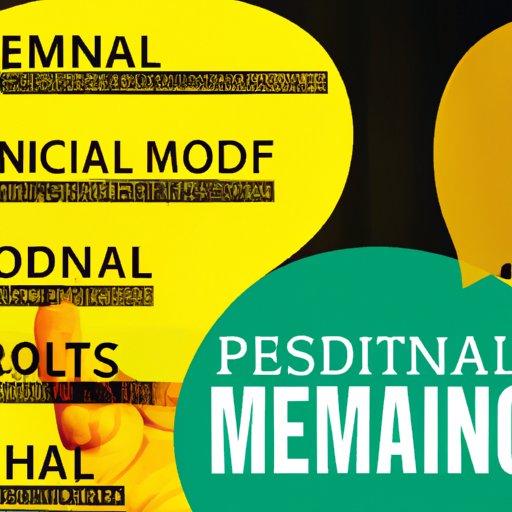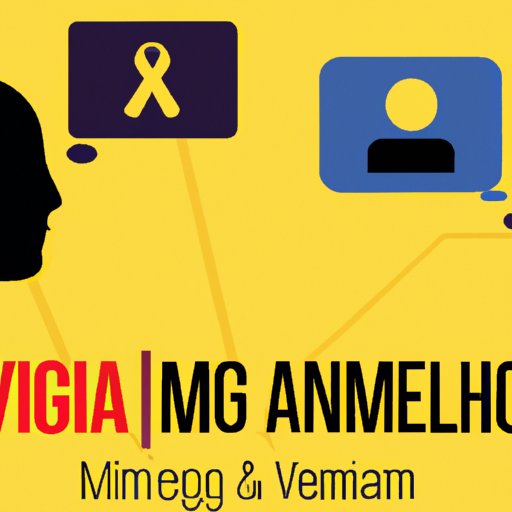
I. Introduction
Stigma in mental health is a significant problem that has long been embedded in society. It is the negative perception and attitude towards people with mental health conditions that should not exist in a world of progress and acceptance. This article aims to define stigma in mental health, discuss the impact of stigma on individuals with a mental health condition and provide different strategies for reducing stigma. In this article, we will also analyze the role of media and its effect and debunk the myths associated with mental health stigma.
II. Defining Stigma in Mental Health: Understanding the Problem and the Impact
Mental health stigma refers to the negative attitudes and beliefs towards individuals who have mental illness conditions and their families. Stigma, in reality, goes much deeper than a mere perception or attitude, leading to discrimination and social exclusion often causing people to view themselves in a much poor light and avoid getting support or seeking help. The significant impact of stigma is the unjust stereotyping and discrimination of people who have mental health issues, leading them to be treated differently than anyone else with a medical condition. This discrimination creates a barrier for people seeking mental health support, and it affects people’s chances of employment, relationships, and schooling.
III. Breaking the Stigma: Advocating for Mental Health Awareness and Acceptance
The journey for destigmatizing mental illness must be championed without relent, and advocacy for mental health awareness and acceptance is essential for that to happen. Fighting back against the stigmatization of mental illness is crucial in ensuring that people can access quality healthcare, education, maintain employment, and engage in all the opportunities provided to them free of discrimination. Positive advocacy, education, and awareness can effectively help to change the conversation and bring light to the reality of mental health conditions, breaking down the barriers that cause disadvantageous outcomes for people experiencing it.
There is an increased push for mental health acceptance and awareness, with different organizations emerging and taking part in different advocacy campaigns. Organizations like the National Alliance on Mental Illness (NAMI) and Bring Change to Mind have been in the frontline in advocating acceptance and awareness. These organizations encourage dialogue about mental illness, inspire individuals to share their stories, and support those experiencing mental illness and their families through education and resources.
IV. The Consequences of Stigmatizing Mental Illness: Why Anti-Stigma Campaigns are Necessary
Mental health stigma can lead to various negative public impacts, including avoidance of individuals with mental illness, bullying, social exclusion, and incorrect assumptions about people with mental health conditions. Stigma makes people less likely to seek help and reduces their ability to interact and relate with their community. For instance, people with a history of mental illness often experience difficulties getting employment, healthcare, and overall socialization. Stigmatizing of mental illness causes individuals with a mental illness to feel ashamed, isolated, and to become hopeless about the outcome of healing.
The difference made through anti-stigma campaigns is so profound; the campaigns have sparked conversations around the world, with people learning more about mental illness, talking about it and paying attention to advocates. The hashtags #IAmNotAshamed, #EndStigma, and #MentalHealthAwarenessMonth are some examples of how social media can be used positively to spread awareness. Also, different organizations, mental health institutions, and governments are taking part in different anti-stigma campaigns aimed at reducing mental health stigmatization.

V. Stigma in Mental Health: The Role of Media and its Effect on Public Perception
The media often portrays individuals with mental illness as being violent and dangerous, which is not true. This negative representation of individuals suffering from mental illness creates and reinforces stigma in society. Different films, TV shows, music videos and books continue to perpetuate harmful stereotypes of people with mental illness that put them at the wrong end of the narrative. For instance, movies like Psycho, The Shining, and Silence of the Lambs have depicted people with mental illness as violent and dangerous.
The media also negatively portrays people with mental illness by using derogatory language when reporting mental health issues. The use of words like “crazy,” “lunatic,” and “psychotic” reinforces negative stereotypes and make people with mental illness to feel ashamed, isolated, and fearful about reaching out when in need. However, media can be an agent of change by creating positive representations of people with mental illness, portraying them as capable, and also ensuring headlines follow a more empathetic and compassionate phraseology.
VI. The Economics of Stigma: Exploring the Negative Impact of Stigmatizing Mental Health on Society
The stigmatization of mental health also carries economic consequences. Generally, discriminating people with mental illness in the workplace and other areas affects a country’s economy. By the time individuals with mental health conditions get the care they require, their conditions may have worsened, leading to a loss of employment for both the individual and the economy as a whole. The indirect cost of untreated mental health conditions includes avoidance of work, productivity loss, and healthcare expenditures. The cost of healthcare is higher for people suffering from mental illness conditions than those without, posing a significant economic burden on societies that fail to provide the support required to manage them effectively.
VII. Debunking Myths around Mental Health Stigma: Separating Fact from Fiction
Mental health stigma leads to various myths, and it’s necessary to debunk these myths with fact and data. Here are some of the most common myths around mental health stigma and the actual facts:
- Myth #1: People with mental illness are weak.
- Fact: Mental health conditions are not the result of a lack of strength. They are an illness, like any other health condition, and need to be treated by a professional.
- Myth #2: People with mental illness are violent and dangerous.
- Fact: People with mental illness are no more violent than people without a mental illness. In fact, they are generally more at risk of being the victims of violence.
- Myth #3: Mental illness is a choice.
- Fact: Mental illness is not a choice. Nobody would intentionally choose to have a mental illness, and blaming or shaming them for it is both unfair and counterproductive.
- Myth #4: People with mental illness cannot recover.
- Fact: People with mental illness can and do recover, with treatment and support.
VIII. Fighting Stigma: Strategies for Reducing Stigma towards Mental Health in Communities and Society
The following are ways individuals or communities can help reduce stigma towards mental health:
- Increasing education and awareness around mental illness and its impact.
- Providing supportive and safe environments for people affected by mental illness.
- Challenging negative portrayals and myths about people with mental illness.
- Encouraging dialogue and conversations about mental illness to reduce the stigma that surrounds and perpetuates it.
- Reducing language that is derogatory or negative about mental illness and people with mental health conditions.
- Supporting organizations that advocate for mental health awareness and acceptance.
IX. Conclusion
In conclusion, mental health stigmatization is a significant issue that needs to be addressed. It’s essential to foster a society that promotes acceptance, awareness and advocates for mental illness as a real medical condition and not a choice. Mental health stigmatization carries a considerable cost on individuals’ mental and physical health, economy and society’s progress. We should all play a role in reducing the stigma of mental health conditions, looking out for ourselves and others, listening with empathy and encouraging one another to seek help when necessary. Breaking down these barriers of stigma helps to promote a healthier society, where people are empowered and free to be whoever they want and live life to the fullest.





